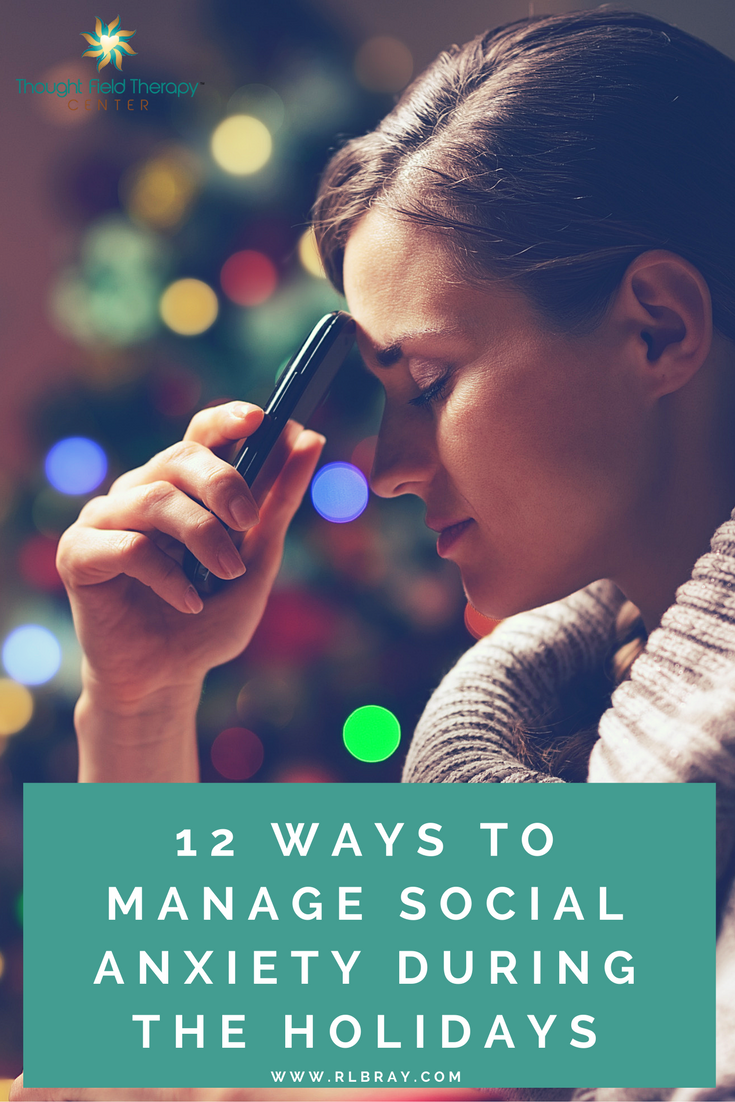Social anxiety during the holidays is at an all time high. And it’s no wonder why. Costco has Christmas trees out in August! Monster Mash is replaced with Frosty The Snowman, and stores start pushing you to do your holiday shopping well before you’ve even finished your Thanksgiving dinner. It can be anxiety-inducing for anybody, but for those who suffer from social anxiety, the holidays can be especially trying.

How Are People Affected By Social Anxiety During The Holidays?
From work parties to parades to shopping, the demands on your time, energy and emotions are endless. Struggling with social anxiety during the holidays makes some people never want to leave the house again.
Social anxiety disorder affects more than 15 million adults in the United States. Its symptoms include:
- Anxiousness around other people
- Difficulty (or even complete inability) talking to people
- Self-consciousness
- Fear that other people will judge them
- Severe anxiousness in the days or weeks leading up to an event
Social anxiety also manifests itself physically in the form of increased heart rate, muscle tension, dizziness, difficulty breathing, sweating, shaking and feeling nauseous. The severity of the symptoms, and of the anxiety disorder, varies from person to person. Some people feel anxiety surrounding certain situations, such as eating or speaking in public, while others have a severe phobia of all social situations, even family gatherings. Typically if a person experiences the symptoms of social anxiety for 6 months or more, they are diagnosed with a social anxiety disorder, but many suffer in silence for far longer than that before seeking help.
While the exact causes of social anxiety disorders are unknown, the fact is that millions of people suffer from these disorders. The good news is, there are many ways to reduce social anxiety during the holidays.
12 Ways To Manage Social Anxiety During The Holidays:
- Plan ahead. Anticipating upcoming social events that may trigger social anxiety allows you to plan how you’ll manage the situation in advance, and can help reduce anxiety.
- Talk about it. Talking to a close, trusted friend or family member can help you process your feelings and provide new perspectives.
- Have a buffer. Plan to attend parties and other social events with a friend or colleague who can act as a buffer if you start to become overwhelmed or anxious.
- Stay in the moment. Focus on what’s happening, rather than what you’re feeling. Sometimes distraction is the best medicine. If you’re at a party at a friends house, ask if you can help in the kitchen or if you can make something to bring. This can help to take your mind off of your anxiety.
- Stay healthy. Eating foods that are high in sugar, fat, caffeine and alcohol, increase your energy, which can also increase your anxiety levels. You can keep your anxiety in check by purposing to maintain a healthy diet.
- Focus on one person at a time. If you think about all 25 people you have to connect with at a party, you’ll end up feeling overwhelmed. Take it slow. Pick someone you already have a connection with and have a conversation. You don’t have to talk to everyone in the room, so don’t pressure yourself to do so.
- Go to the bathroom. If you’re feeling overwhelmed, excuse yourself to the restroom. This is a great way to take a mini “break” in the middle of a party. Take a moment to just sit and catch your breath, then when you’re ready, head back out to the party.
- Get some pet therapy in. If the person hosting the party has a dog or cat, allow yourself a moment to just sit with the pet. Dogs are typically easier to locate than cats, and they will love the attention. Spend a few minutes petting the dog – you’ll make her happy, and you’ll feel more relaxed, too.
- Don’t drink too much. People often mistakenly think that drinking loosens them up. The truth though, is that drinking can actually make anxiety worse and may trigger panic attacks. Drinking also lowers inhibitions and can cause you to say or do things you wouldn’t under normal circumstances.
- Identify your triggers. From overstimulation and fear about saying or doing the wrong thing, to the stress of traveling and being worried about fielding questions you don’t want to answer, there are a lot of different reasons people experience increased social anxiety during the holidays. Knowing your triggers, and breaking them down can help make them less overwhelming and easier to tackle.
- Take the focus off of you. The truth is, most people aren’t paying that much attention to how you look, how successful your year was, or how well you carry a conversation. In fact, most people are in the same place you are, just hoping that others will think well of them. Get the ball rolling by complimenting someone, or asking a question. People love to talk about themselves, so this is a great strategy to avoid having to talk about yourself, and complimenting others makes them feel good, which will make you start to feel good as well!
- Give TFT a try. Thought Field Therapy is a natural, pain-free, side-effect free method for managing many issues and emotions, including anxiety. If you’ve never tried it before, you can see a demonstration of the basic algorithm for anxiety here in the video below. This algorithm can be used anywhere, any time, and you can do it on your own so there’s no need to share anything you don’t want to share. Give it a try at home or in the car before heading to a party, or excuse yourself to the bathroom during the party and take a few minutes to calm down. TFT can help to manage the overwhelm in the moment, so you can get back to enjoying the party.
Here at the Thought Field Therapy Center of San Diego, we use a combination of traditional talk therapy and Thought Field Therapy to help our clients navigate and overcome challenging circumstances. If you’d like more direct support in managing social anxiety during the holidays, or any time of the year, contact us now to learn how we can help.


Comments 2
Is anxiety curable? I’ve been getting treatment for years and I still
get bad symtoms sometimes. I would appreciate
any insight you can provide.
Hi,
Yes it is curable.
Is the anxiety related to or triggered by unresolved traumatic stress event?
Is the anxiety related to on-going or re-occurring situations or conditions?
Is the anxiety related to exposure to ingested, inhaled, or contact Individual Energy Toxins?
Is the anxiety about being depressed or unhappy or afraid?
The answers to these questions will direct the needed treatment and maybe difference TFT tapping patterns or techniques.
Don’t give up on being better.